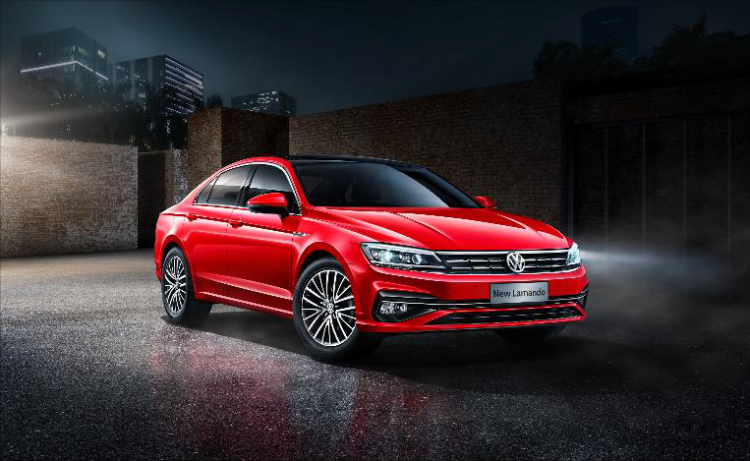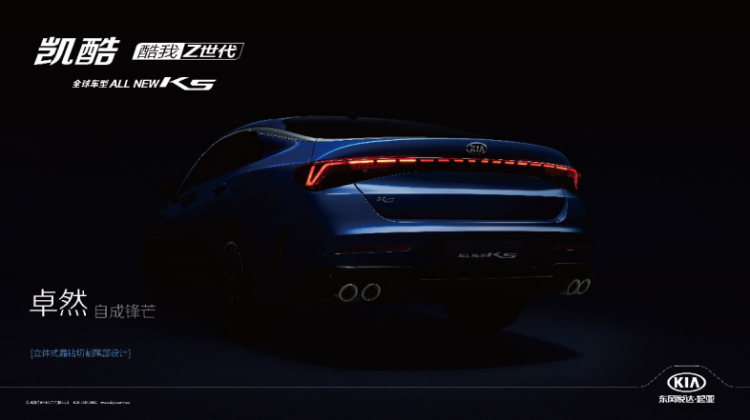Shanghai, July 2, 2020 – JD Power (Jundi), the world’s leading consumer insight and market research institution, today officially released the 2020 China Auto Sales Satisfaction Study SM (SSI). The research shows that the percentage of consumers who have abandoned a purchase before entering a store has increased for the fourth consecutive year, from 10% in 2017 to 43% in 2020. As China’s auto market has officially entered the stock market stage, the passenger flow before entering the store is very precious, and the loss rate of consumers in the early stage of car purchase is increasing year by year, which should arouse the high attention of auto brands and dealers.
This is the 21st year in a row that JD Power has conducted a car sales satisfaction study in the Chinese market. The study focused on evaluating the overall satisfaction of new car owners with a car ownership period of 2 to 6 months. Sales satisfaction is composed of car buying customer satisfaction and defeated customer satisfaction. A defeated customer means a consumer who seriously considers a certain brand but finally buys another brand.
The study found that targeted brand understanding and pre-store communication are key aspects of pre-store customer churn. Among them, the proportion of consumers who targeted brand churn increased from 6% in 2017 to 24% this year. , the proportion of customer churn in the pre-store communication phase increased from 4% in 2017 to 19%. The main reasons for the loss of customers before entering the store include gradually discovering that the model is not suitable, the style and appearance of the model are not as expected, and there are too few models to choose from.
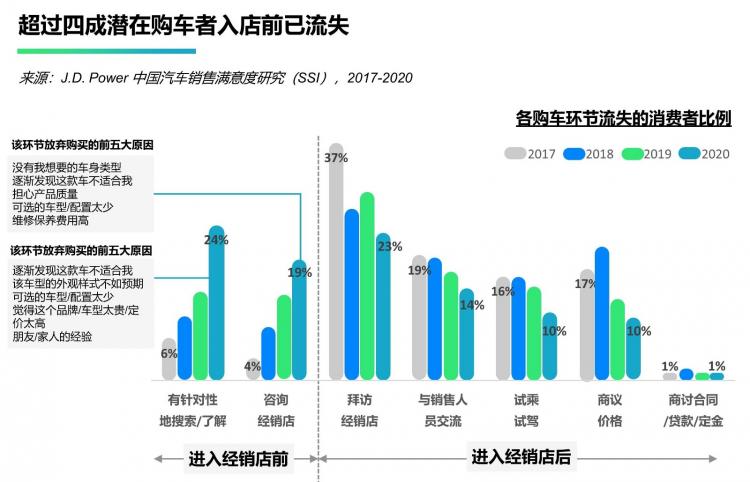
More than 40% of potential car buyers have been lost before entering the store, source: JD Power 2020 China Automobile Sales Satisfaction Study (SSI)
Ren Hongyan, vice president of digital customer experience at JD Power China, said: “The proportion of consumers who lose the communication link before entering the store is increasing, and they also mention many reasons for abandoning the purchase, so this link is an important part of whether to successfully convert sales leads. Opportunity point. At this time, consumers have not had a real product experience, and their lack of understanding of the product makes them evaluate and conclude the product prematurely. The dealer should actively guide customers in the communication link before entering the store Establish contact with customers, actively understand customer needs for products and services, and invite customers to take a test drive, so that customers can feel the sincere service attitude and humanized service spirit, and attract customers to further understand the product.”
The study also found that the car buying experience has a positive effect on consumers buying a car. In 2020, car buying experience (16%), together with product quality (30%), brand (19%), product design (18%), and price (16%), together constitute the five major determinants of car purchases by Chinese consumers.
“As the epidemic prevention and control has achieved remarkable results, China’s auto industry has begun to slowly recover. While continuing to consolidate the foundation of products and brands, auto manufacturers should also increase their attention and investment in sales, and take advantage of the opportunity to get close to users. Fully demonstrate the advantages of products in terms of quality, design and even branding, and prompt consumers to make purchasing decisions. Those companies that continue to invest in brand, product and service improvement are more likely to gain more market during the small growth peak after the epidemic. ” Ren Hongyan thinks.
Here are other findings from the study:
· The gap in sales satisfaction scores between mainstream cars (708 points) and luxury cars (715 points) narrowed further: the gap between the two narrowed to 7 points from 29 points in 2019. In the past three years, the sales satisfaction of self-owned brands has been continuously improved, and the gap with the industry average has narrowed from 22 points in 2018 to 9 points in 2020.
· The proportion of car buyers born in the 1990s exceeds that of other age groups, and the satisfaction is the highest: In 2020, the car buyers born in the 1990s (32%) exceeded those born in the 1985s (30%), 80-84 (22%) and pre-80s (17%) for the first time. ) to become the main force in car buying. The practice of car manufacturers to improve the customer experience of the post-90s young group has achieved remarkable results: the post-90s generation has become the group with the fastest improvement in satisfaction and the highest satisfaction among all age groups, an increase of 76 points compared with 2017.
· Only 18% of replacement car owners choose replacement transactions: In 2020, the proportion of car buyers who pay attention to information on replacement of old cars is 3.1 times that in 2017, but the car owners who actually carry out replacement transactions account for only 18% of all replacement car owners. The dealer’s moderate recommendation of replacement services can effectively increase the willingness of car owners to replace old cars, and at the same time help to reach the final transaction price of new cars and revitalize used car transactions, establishing a closed loop of new car sales, replacement transactions and used car business.
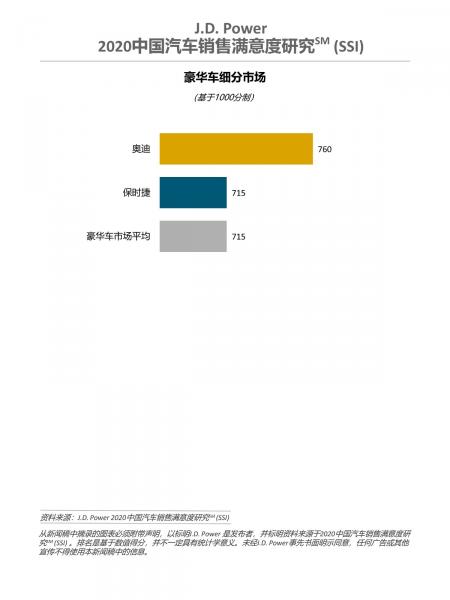
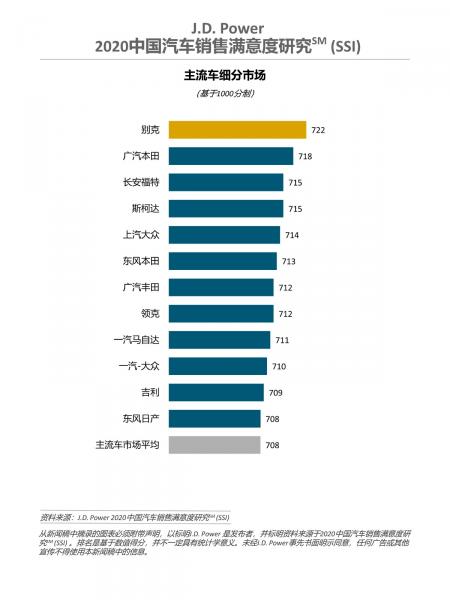
2020 China Auto Sales Satisfaction Ranking
For the eighth consecutive year, Audi topped the luxury car market’s sales satisfaction rankings with a score of 760. Porsche came in second with 715 points.
Buick ranked first in the mainstream car market with 722 points, Guangzhou Automobile Honda ranked second with 718 points, and Changan Ford and Skoda tied for third with 715 points.
The JD Power 2020 China Auto Sales Satisfaction Study (SSI) evaluates the overall satisfaction of car owners with their new car purchase experience between 2 and 6 months after purchasing a car. The 2020 SSI index model has been redesigned. The redesigned index model transforms the language of sales and service into consumer experience paths, and unifies the factor structure of car buyers and defeated customers.
The overall consumer satisfaction index is composed of the car purchase customer index and the defeated customer index. Among them, the car purchase customer index includes online experience (18%), communication before entering the store (9%), reception at the store (14%), car viewing in the store (13%), test drive (10%), transaction process (17%) %) and the delivery process (20%) seven factors; the defeated customer index includes online experience (25%), communication before entering the store (22%), reception at the store (23%), car viewing in the store (15%), Test drive test drive (7%) and bargaining experience (9%) are six factors. Sales satisfaction is calculated on a 1,000-point scale.
The 2020 study is based on feedback from 23,151 vehicle owners who purchased a new vehicle between May 2019 and February 2020. Data collection was conducted in 70 major Chinese cities between November 2019 and April 2020.


